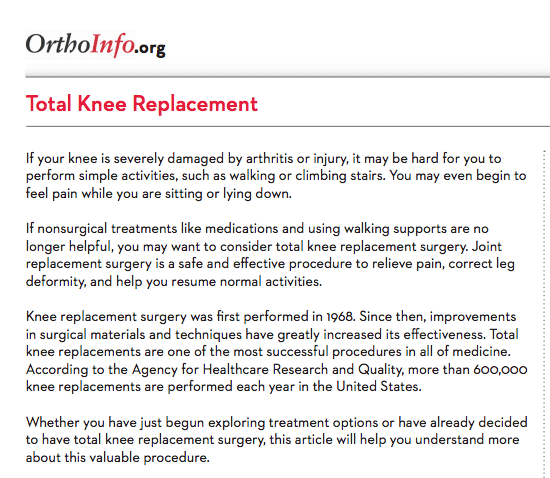Is Knee Replacement Right for Me?

Making the Decision on Having a Knee Replaced
For many, this is not a decision that is easily or quickly made. The final decision is yours. Because this is a big decision, having conversations with your doctor and your family is important to do before making your decision. Other things that can help you with your decision is to read about the surgery and talk with others who have knee problems and who have had their knee replaced. Surgery may or may not be right for you, depending on your quality of life goals.
DISCOVER
(Click to See Answers)
What is one of the first steps I should take before making the decision to have surgery?
The American Academy of Orthopaedic Surgeons recommends talking with your doctor and asking for a referal to an orthopaedic (bone) surgeon for evaluation. This is a doctor specially trained to treat problems with the bones and joints. The surgeon will help you decide if you are a candidate for the knee replacement, and will take your medical history, perform a physical examination, and X-ray your knee, according to the American Association of Hip and Knee Surgeons. Not everyone is a candidate for this type of surgery, which is why talking with your doctor is so very important.
For what reasons would a doctor adivise me not to have a knee replacement?
- You have an infection in your knee (currently or previously)
- You have advanced arthritis, with pain, that your doctor suggests you try other forms of treatment, like physical therapy, injections, medications or bracing, before having surgery
- You are overweight and the doctor believes this places you at too high a risk for complications after surgery
- You have heart or lung disease that may complicate anesthesia or place you at risk for other complications
- You have other conditions that could make it too much of a risk to have the surgery (e.g., unhealthy skin condition where the incision would be made, severe blood circulation disease, and others)
What are the most common alternatives to surgery that my doctor might recommend?
According to the American Academy of Orthopaedic Surgeons and the American Association of Hip and Knee Surgeons, here are some of the most common alternative treatment options doctors may suggest, before recommending surgery to replace your knee:
- Exercises and/or physical therapy to strengthen the muscles around the knee, which also help to improve knee flexibility
- Medicines to relieve your pain
- If needed, weight loss to reduce the load the knee is carrying
- Walking aids, like canes, braces or walkers to help stabilize the knee and reduce stress on your knee
- Shoe inserts to help with better aligning your knee
- Injections to manage pain and reduce inflammation in and around your knee
FAST FACTS
Average # Years a Total Joint Replacement Lasts (American Acedemy of Orthopaedic Surgeons)
%
The % knee replacements that last 20 years (American Association of Hip and Knee Surgeons)
NOW WHAT?
Tools & Resources at Your Fingertips
